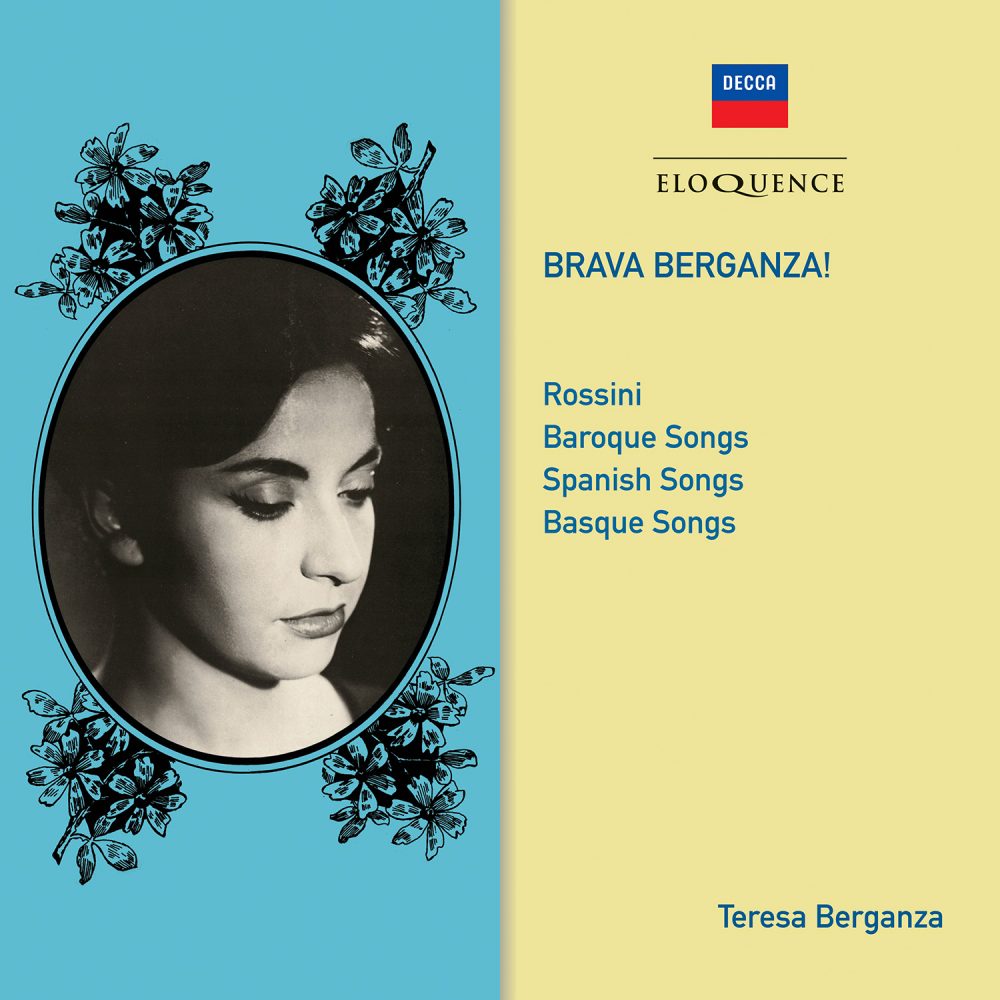A newly remastered collection of four original Decca albums featuring the Spanish mezzo-soprano at the height of her powers in the repertoire most associated with her, from Rossini to folk and popular songs from her native Spain.
Born in 1935, Teresa Berganza was in her mid-twenties when she made the recordings on this album, yet she was already the darling of the opera press by June 1959 when Decca first issued the wide-ranging recital of Rossini arias which opens this anthology, moving with assured mastery from the flirtatious Isabella in ‘L’italiana in Algeri’ to the grave beauty of ‘Fac ut portem’ from the ‘Stabat mater’. Later the same year, she recorded a sequence of eight Basque songs with orchestra which captivatingly exploits the dark, sultry shadings within her mezzo. Although the Rossini LP has been issued piecemeal on CD, this is the first time the recital appears in its entirety.
A year later, Berganza was established as an artist of singular gifts who would lend distinction to the extraordinary ‘gala sequence’ inserted in the second act of the label’s new Viennese recording of ‘Die Fledermaus’, capable of standing her own alongside the likes of Björling, Nilsson, Sutherland and Tebaldi. Her contribution to that album was a Lullaby by her husband Félix Lavilla which they recorded together not in Vienna but Kingsway Hall, London.
As her long-standing accompanist, Lavilla partnered Berganza in a 1962 recital of Spanish songs that capture the mezzo-soprano in vibrant form, bringing her flaring tone, dramatic energy and captivating charisma to Baroque arias by Pergolesi and Scarlatti as well as songs by Granados and Turina, finishing with a classic account of Falla’s ‘Siete canciones populares españolas’ from 1959. As Richard Wigmore remarks in his new booklet appreciation, not even the legendary Conchita Supervia gave a more thrilling, spine-tingling performance of the cycle’s concluding ‘Polo’.
CD 1
GIOACHINO ROSSINI
Il barbiere di Siviglia:
Una voce poco fa
Contro un cor che accende amore
L’italiana in Algeri:
Cruda sorte! Amor tiranno!
Per lui che adoro
Amici … Pensa all patria
Stabat Mater: Fac ut portem Christi mortem
Semiramide: Bel raggio lusinghier
La Cenerentola: Nacqui all’affanno e al pianto … Non più mesta
London Symphony Orchestra
Alexander Gibson
JACINTO GUERRERO: Sagrario’s Romanza
PEDRO MIGUEL MARQUÈS: Margarita’s Romanza
Orchestra conducted by Benito Lauret
PADRE JOSE ANTONIO DE DONOSTÍA
RESURRECCION MARIA DE AZCUE:
Eight Basque Songs
Orchestra conducted by Gerardo Gombau
JOSE JUAN CADENAS MUÑOZ
QUINITO VALVERDE:
Clavelitos*
RUPERTO CHAPÍ Y LORENTE: Carceleras*
Orchestra conducted by Benito Lauret
CD 2
LUIGI CHERUBINI: Ahi! Che forse ai miei dì (Demofonte)
ANTONIO CESTI: Intorno all’idol mio (Orontea)
Attrib. GIOVANNI BATISTA PERGOLESI: Confusa, smarrita
ALESSANDRO SCARLATTI
Qual mia colpa … Se delitto è l’adorarvi
Chi vuol innamorarsi
La Rosaura
Elitropio d’amor
JESUS GURIDI:
Cómo quieres que adivine
Mañanita de San Juan
FELIX LAVILLA: Four Basque Songs
JOAQUIN TURINA: Saeta en forme de Salve a la Virgen de la Esperanza, Op. 60
ENRIQUE GRANADOS:
El tra la la y el punteado
El majo timido
La maja dolorosa
JOAQUIN TURINA: Farruca (Treptico)
MANUEL DE FALLA Seven Popular Spanish Songs
FELIX LAVILLA: Lullaby
Félix Lavilla, piano
Teresa Berganza, mezzo-soprano
*FIRST CD RELEASE ON DECCA
Recording Producers: Christopher Raeburn, Ray Minsull (Rossini); Christopher Raeburn (Cesti, Cherubini, Pergolesi, Scarlatti, Granados, Guridi, Lavilla, Turina); Michael Bremner (Lavilla: Lullaby)
Balance Engineers: Kenneth Wilkinson (Rossini); Michael Mailes (Cesti, Cherubini, Pergolesi, Scarlatti, Granados, Guridi, Lavilla, Turina); Alan Abel Cyril Windebank (Lavilla: Lullaby)
Recordings: Walthamstow Assembly Hall, 17–20 February 1959 (Rossini); Kingsway Hall, London, UK, 10 June 1960 (Lavilla: Lullaby); Decca Studio 3, West Hampstead, London, UK, 17–20 January 1962 (Cesti, Cherubini, Pergolesi, Scarlatti, Granados, Guridi, Lavilla, Turina); Spain, 1959 (Falla, Valverde/Muñoz, Chapí y Lorente, Guerrero, Marquès, Donostia/Azcue)
Remastering Engineers: Paschal Byrne (CD1); Chris Bernauer (CD2)
Original Decca LP Releases: SXL 2132/LXT 5514 (Rossini); SEC 5052 (Falla); SDD 324 (Spanish songs, Basque songs); SXL 6005/LXT 6005 (Cesti, Cherubini, Pergolesi, Scarlatti, Granados, Guridi, Lavilla, Turina); SET 201–3 (Die Fledermaus: Gala sequence)
‘She is equally at home in the fiendish Cenerentola finale (the best I’ve ever heard) and in the long sweeping line of ‘Fac ut portem’… I can see no obstacle to a long and brilliant career for this singer. The accompaniments are clear and firm, and Decca’s stereo sound is bright and full. I recommend this record without hesitation.’ High Fidelity (Rossini)
‘In the Basque songs she immediately identifies herself with each mood from tenderness to humour… I called her performance of [the Falla songs] incomparable, and it still remains so, with her completely idiomatic interpretation, vitality, exemplary enunciation, beautifully clean melismata, and wide range of colour… If for any reason you didn’t have a copy before, make good the omission straight away.’ Gramophone

